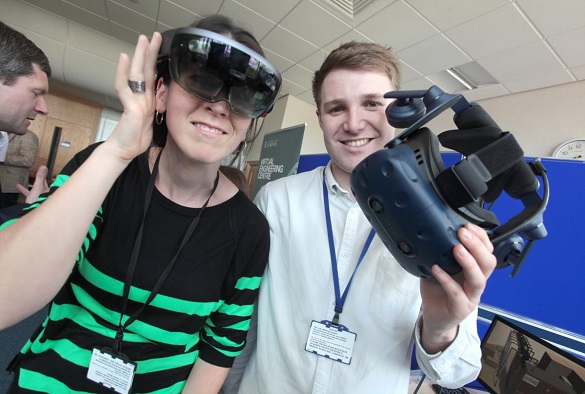LCR4.0, a part ERDF funded business support programme for the manufacturing sector which involves the University of Liverpool’s Virtual Engineering Centre, has created 80 new jobs and added £2.6m GVA to date.
Furthermore, it is predicted that the project will add an additional 955 jobs and £31.1m GVA to the local economy in the next three years according to figures revealed at a Technology Showcase event which took place at Sci-Tech Daresbury.
The University’s Virtual Engineering Centre is the lead technology partner in LCR4.0 and has been hailed as an ‘exemplar project’ in the Made Smarter Report and has featured in the Top 100 European Digital Champions list by the Financial Times
LCR4.0
The LCR4.0 project has given almost 300 SMEs the tools and resources to explore the opportunities and challenges of Industry 4.0 technologies, such as big data, systems integration, Internet of Things (IoT), augmented reality (AR) and 3D printing. In using this advanced technology, SMEs can increase productivity, reduce costs and pioneer new innovations.
The Technology Showcase celebrated the success and impact of the LCR 4.0 programme, as well as a platform to highlight the additional support and funding available to SMEs across the North West.
Speaking at the event, Metro Mayor Steve Rotheram praised LCR 4.0, its partners and the SMEs it works with for their contribution in positioning Liverpool City Region as a global leader in advanced manufacturing.
“There is a truly entrepreneurial spirit running through Liverpool City Region. Because of this, the region can become, and in my opinion is becoming, a manufacturing global hotspot. Programmes like LCR 4.0 are making that possible, establishing innovative and dynamic manufacturing communities across the six boroughs.”
Feedback
A recent survey by LCR 4.0 found that 82 per cent of SMEs say the programme changed their understanding of Industry 4.0, while over two thirds of businesses said it helped them to bring a product to market quicker. Innovative capacity was also enhanced in 82 per cent of respondents and three quarters were encouraged to be more ambitious as a result of the project.
Dr Andy Levers, technical director at the Virtual Engineering Centre (VEC) and technical lead for LCR 4.0, said: “These figures are real testament to the impact of the LCR 4.0 programme to date and that, if a business starts to operate in a more innovative way, they will generate better results quicker.”
The LCR 4.0 project, which is due to come to close later this year, is delivered by the VEC, Liverpool John Moores University, Sensor City, STFC Hartree Centre and the Liverpool City Region LEP.
